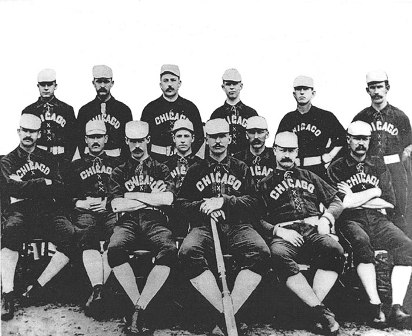Charles “Chief” Zimmer was acquired by the Philadelphia Phillies to play for and manage the team in 1903; it was assumed he couldn’t do worse than Bill Shettsline who led the team to a 56-81 record the previous season. He did.
Unlike nearly every other “Chief” in 19th Century baseball, Zimmer had no Native American blood and various stories have circulated as to the origin of the nickname. His 1949 obituary said:
“In 1886 he joined Poughkeepsie as captain and manager…”since we were fleet of foot we were called Indians. As I was the head man of the Indians somebody began to call me “Chief.” It stuck.”
The Pittsburgh Press said in 1904:
“Zimmer received his sobriquet as ‘Chief’ because of his facial resemblance to an Indian, although he is a German.”
Zimmer was one of the best catchers in baseball for more than a decade. He had brief trials in the National League with the Detroit Wolverines and American Association with the New York Metropolitans from 1884 and 1886, and was playing for the Rochester Maroons in the International Association in 1887 when his contract was purchased for $500 by the Cleveland Blues of the American Association.
Zimmer was the starting catcher for the Blues when the team moved to the National League and became the Cleveland Spiders in 1889, and remained in Cleveland until 1899. In 1890, he caught 111 straight games; which was the Major League record for 19 years.
By January of 1903 the 43-year-old’s best days were behind when Philadelphia acquired him on waivers from the Pittsburgh Pirates and named Zimmer manager.
After a 2-2 start, the Phillies never saw .500 again and Zimmer quickly lost control of his team.
The team went into June with an 11-26 record. Things got worse that month in Cincinnati when Zimmer put the team’s captain, centerfielder and leadoff man Roy Thomas into the lineup–Thomas was a devout Christian who did not want to play on Sundays. The Philadelphia Record said:
“Manager Zimmer had some trouble getting Roy Thomas to play in the Sunday game, he claiming that he had not contracted to play on Sunday, and that he had no desire to break the Sabbath. In the end, however, Zimmer prevailed and Thomas went into the game.”
The Philadelphia Times said Zimmer talked to the team’s new owner, James Potter, who was reported to have said:
“So he won’t play today, eh? Well, then place him on the bench today, tomorrow and for the remainder of the season, without pay.”
Thomas relented, but told reporters before the game::
“I’m playing under protest. There’s nothing in my contract that exempts me from playing on Sunday, but when I signed it I had no idea that the Philadelphia Club would change hands and abandon old precepts.”
The following Sunday, with the Phillies in Chicago, The Associated Press (AP) said:
“Thomas made his protest doubly strong and backed it up by staying out of uniform that day.”
After Philadelphia’s 4 to 2 loss, The Chicago Tribune said:
“The Phillies were somewhat crippled by the absence of Roy Thomas who does not like the new ownership of the club, because it believes in Sunday games. which Roy does not.”
As a result The AP said, other players on the slumping team suddenly found religion.
“Now several other members of the team declare that they are as much opposed to playing baseball on Sunday as is Thomas and that their religious scruples are just as strong as his.”
The article quoted an unnamed member of the Phillies:
“(I)f the club insists on showing partiality to Thomas the others who also object to playing on Sunday, but who are willing to help out the club, will insist on the same privileges.”
Zimmer faced a full-blown revolt as they prepared to embark on a 19 game road trip:
“All of which portends a pleasant trip in the West for Zimmer when he starts out again.”
The Philadelphia papers did not continue to pursue the story during the Phillies’ 4-15 road trip, but it seems that for the remainder of 1903 Thomas backed off of his demand as he appears in box scores for several Sunday games in the final three months of the season.
The Phillies limped to a 49-86 seventh place finish, seven less victories than the previous season under Shettsline. Zimmer was dismissed at the end of the season and was replaced by Hugh Duffy.
Thomas’ Sunday request was granted the following season, with manager Duffy making most of his appearances as a player in 1904 on Sundays when his centerfielder took the day off. There is no record of teammates complaining about Thomas’ Sunday schedule under Duffy’s management.
Regardless of the team’s new-found harmony, the Phillies under Duffy finished 52-100. Potter sold the team after the 1904 season to Bill Shettsline.
A shorter version of this story was posted 12-18-2012.




Deacon McGuire broke that record in 1895, when he caught all (or more than all, if you go by Baseball-Reference.com: http://www.baseball-reference.com/teams/WHS/1895-fielding.shtml) of Washington’s games.